What is the examiner looking for?
It is extremely important that you understand what the IELTS examiner is looking for in the speaking test. However, it is equally as important to know what the examiner does NOT want you to do.
The examiner does NOT want to see:
- How many answers you have memorised.
- How many ‘big’/’fancy’/’high-level’ words you know.
- How many different grammar structures and tenses you know.
- How ‘British’ or ‘American’ your accent is.
The examiner DOES want to see:
- How well you can communicate through spoken English.
There is a little more to it than that, as you will see below. However, you should always remember that the examiners in the IELTS speaking exam are simply testing if you can open your mouth and communicate in English.
Don’t make it more complicated than it needs to be. Keep it simple!
IELTS Speaking Criteria
There are four parts to the IELTS marks scheme:
- Fluency and Coherence
- Lexical Resource
- Grammatical Range and Accuracy
- Pronunciation
Download the IELTS speaking Band Descriptor
Lets know speaking criteria in detail
Fluency

Fluency refers to your ability to speak smoothly and at an appropriate speed, without any unnatural pauses. This is an area that is often misunderstood by students to mean that you just talk as fast as you possibly can or talking without pausing. If you listen to how native speakers talk they don’t normally talk very fast and there are plenty of pauses. This is totally acceptable, you just don’t want to pause more than normal.
Fluency Criteria
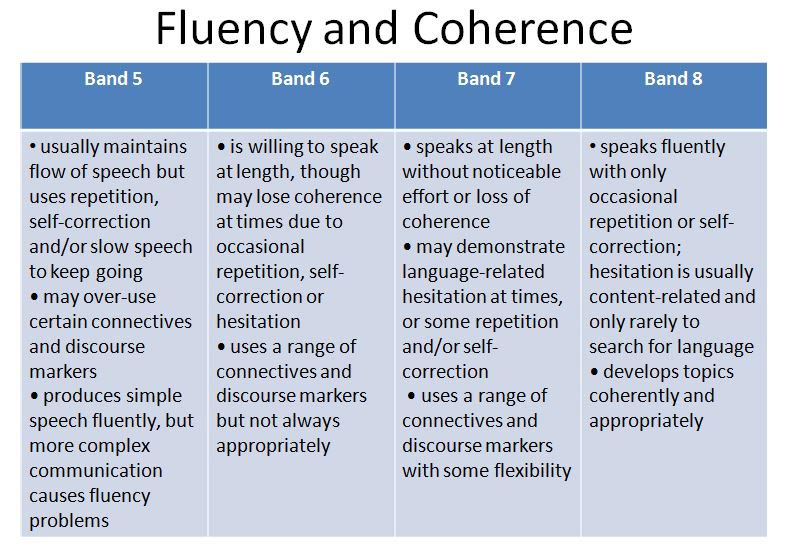
Band 5 students typically use ‘slow speech and repetition’ and often have problems when asked to talk about more complex issues. What leads to this ‘slow speech and repetition’ is often caused by students not being able to think of the correct grammar or vocabulary to explain themselves, so the better your general level of English the less likely you are to have problems in this area.
If we go up the bands to band 7 we can see that this person does not have these repetitions and their speech is natural and smooth because they are not searching for language.
Solution– Understand that being fluent is about talking a natural speed and not very quickly.
Coherence
Coherence literally means being logical and consistent. For the IELTS speaking criteria this refers to how you expand and explain your answers with explanations and examples, answer the question being asked and how you connect sentences together using discourse markers and tenses.
Simply it means that when the examiner asks you a question they clearly understand your answer and you have answered the question fully.
Discourse markers- or linking words or cohesive devices as some people call them- are words that signal to the listener what you are talking about. For example you might want to add an additional point, so you might use a discourse marker like ‘As well as that’ or ‘On top of that’. If you wanted to give an example you might say ‘For example’ or ‘For instance’.
Coherence Criteria

A band 5 student not only uses these discourse markers, but overuses them. If you listen to how native speakers actually talk, they don’t use these discourse markers in every sentence and many poor IELTS candidates try to insert them into every sentence. This will actually lower your marks and do more harm than good.
A band 6 student will not overuse discourse markers, but they will use some of them inappropriately i.e. they don’t know the meaning, but use them anyway or get confused about their function. A common mistake is to start off a sentence with ‘In my opinion’ when the rest of the sentence does not actually give their opinion.
Band 7 and 8 students will use discourse markers both accurately and appropriately, or in other words, they know the meaning and they only use them when necessary.
Coherence is also linked to answering the question properly. This means that you do not give very short answers and instead you fully support your answers with explanations and examples when appropriate.
Band 5 students typically only give very short answers and often say the minimum amount required. For example, if the examiner asked you ‘What are the causes of pollution in your hometown.’ the candidate might say something like ‘The main causes are traffic and industry.’ This might be a satisfactory answer in ‘real life’, however, in the IELTS exam you have to show the examiner your level of English.
A band 8 student develops topics fully, so if they were asked the same question as above they might say ‘The main causes are traffic and industry. There are too many cars in our city and the fumes from the exhausts leads to heavy smog, especially during rush hour. There are also lots of motorbikes, which collectively causes more pollution than cars and public transport. Then there is the problem with all the factories in the industrial area belching smoke out 24 hours of day. For instance, there are a number of power stations on the edge of the city that burn coal and produce tonnes of CO2 and other harmful gases every year’ In this answer the candidate has not only stated the causes, but also explained what they are and given examples.
Common Problems
- The most common problem here is overusing discourse markers and/or using them inappropriately.
Solution– Make sure you know what each discourse marker actually means and when to use them. You don’t have to learn them all; just a few for each function. Listen to how native speakers talk and count how many times they use them. It will surprise you how little they do. Don’t start every sentence with ‘In my opinion’ and don’t feel like you have to include words like ‘moreover’ and ‘in addition’, native speakers almost never use these.
- Not answering the question is a very frustrating problem for teachers and examiners. Often students answer the question they want rather than the question actually asked. If you don’t answer the question it is very difficult for the examiner to follow what you are saying and your marks will suffer.
Also, when you are in the exam, don’t give memorised answers, answer the question actually asked.
- The final problem is not giving long enough answers. Many students are not confident and want the test to be over as soon as possible and this results in them giving as short an answer as possible. Just like the writing test you need to explain what you mean fully and give examples- where appropriate- to really get the high marks.
Solution– This really depends on what part of the speaking test you are in. For part 1 of the speaking test you should try to give answers that are between 2-3 sentences long. Part 2 requires you to speak for between 1-2 minutes and if you need help with this please see out speaking part 2 guide. Part 3 answers are normally 3-4 sentences long. To extend your answers in part 3, make sure you answer the question and then explain your main points and give relevant examples to support your main points.
Lexical Resource
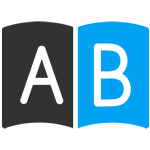
Lexical resource basically means vocabulary. To do well in this area you need to have a wide ranging vocabulary and use that vocabulary accurately.
But what does that mean? Let’s say you are asked to talk about your mobile phone. Some of the words we might use could be ‘advanced’, ‘cutting-edge’, ‘outdated’, ‘modern’, ‘useful’, ‘features’, ‘apps’, ‘screen’, ‘resolution’, ‘operating system’, ‘user-interface’ and so on. Most of these words are very specific to the topics of mobile phones or technology and enable candidates to give a very clear answer to the examiner. Without these words students will really struggle to give a comprehensive answer about mobile phones.
Band 8 and 9 students have such a wide ranging vocabulary that they can talk about any speaking topic because they have the required vocabulary to talk about each of them.
So can you just learn lists of vocabulary and get a 9? No, it is a little more complicated than that. Lots of students learn very long lists of vocabulary and try to use this in the test. The problem with this approach is that students often use these words inappropriately. For example, they might know the word ‘cutting-edge’ but use this to describe a person or a place when it should only really be used to describe technology. If you use words inappropriately it is worse than not using them at all.
Lexical Resource Criteria
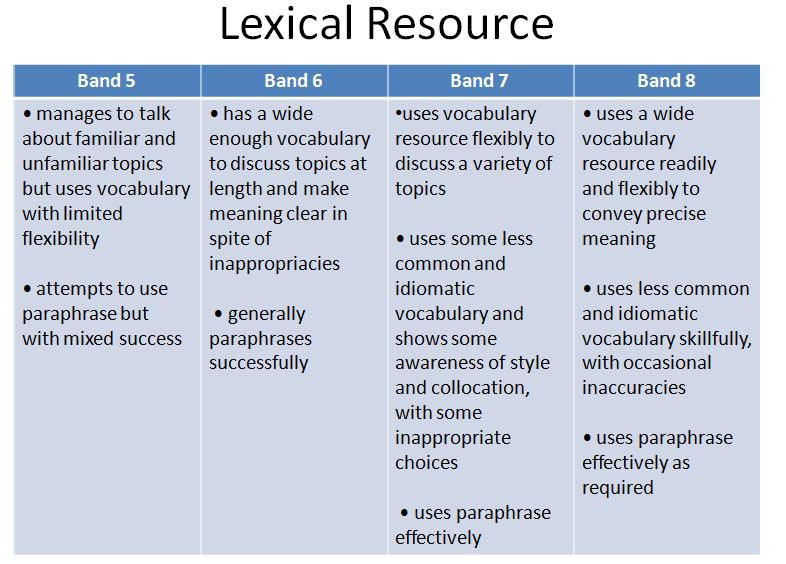
If we look at band 5 candidates, they can only use vocabulary with ‘limited flexibility’. This means that they struggle to talk about a range of topics because they don’t have enough vocabulary. This student might say that their phone has ‘a number of different things’ instead of ‘a range of features.’
Band 6 students have enough vocabulary to talk about most common topics but they have ‘inappropriacies’. This means that they can make their meaning clear by using relevant vocabulary but they make occasional mistakes. An example of inappropriacies would be describing a woman as ‘handsome’ instead of ‘beautiful’ or saying you had a ‘beautiful ‘ weekend instead of an ‘exciting’ or ‘wonderful’ weekend.
Band 7 students have a wide range of vocabulary and can talk clearly about nearly all common topics. They can also use some idioms, when appropriate, and can also use collocations correctly, however some small mistakes are still allowed.
Band 8 students can talk about all common topics and use a wide range of words accurately. They make very few mistakes when it comes to using vocabulary correctly and often use less common words and phrases.
Common Problems
- The most common problem is trying to use vocabulary you are not 100% sure about. Many students try to insert long, complicated words into their speaking test in the hope that this will get them a high score. Unfortunately, you have to use words accurately or you will lose marks. Using lots of less common words inappropriately is one of the signs someone has a very limited vocabulary.
Solution– Follow the 100% rule. Only use words that you are 100% sure about. You should know the meaning, the grammar, collocations, synonyms and antonyms of this word, as well as what context it should be used in. If you don’t know all of these, don’t use it. It is better to use simpler vocabulary and make no mistakes than use very high level vocabulary that is wrong.
- Not having a wide ranging vocabulary. Some students just don’t know enough words to get the higher bands for lexical resource.
Solution– Buy a notebook to write any new words you hear or read. Record them with meanings, synonyms, antonyms, grammar, pronunciation, pictures, example sentences etc. or whatever you think will help you remember them. Make sure you regularly review these words one week, two weeks and one month after you first record them. Try to read and listen to as much English as you can. When you hear a new word, record it.
Grammatical Range and Accuracy

This part of the IELTS Speaking Criteria refers to your ability to avoid making grammar mistakes. You should also have a wide enough range of grammar to be able to talk about a range of things and use complex sentences.
Please take a look at our guide on how to write a complex sentence if you are unfamiliar with them.
For example, the examiner might ask you to talk about the past and future and you will therefore need to be able to use past tenses and future structures. However, it is not just about tenses, although these are very important. You also need to be aware of different types of functional language, such as how to give your opinion, explain something, talk hypothetically and compare and contrast ideas.
Grammatical Range and Accuracy Criteria
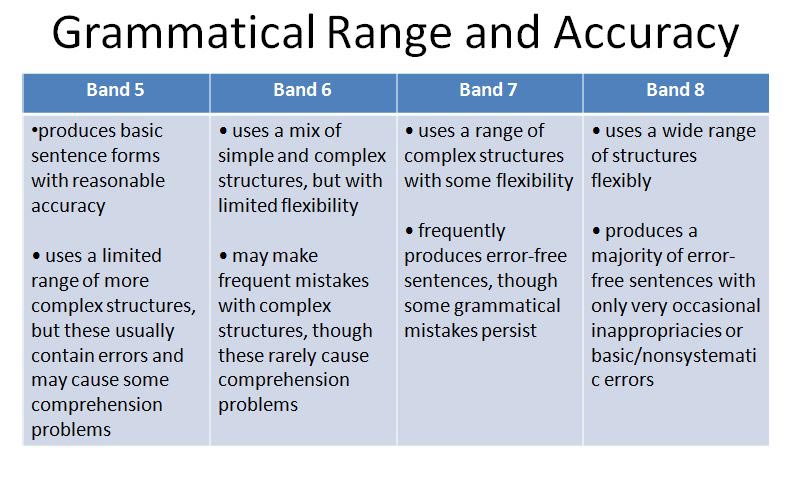
Band 5 answers normally consist of simple sentences that are relatively error free; however band 5 candidates make frequent mistakes when attempting more complex sentences. When trying to use more advanced structures they often makes grammar mistakes that stop the examiner understanding the meaning of the sentence.
Band 6 answers use a mix of complex and simple sentences but mistakes are made more than 50% of the time. The mistakes tend to be small mistakes that don’t stop the examiner understanding what is being said.
Band 7 answers use a variety of complex structures and more than 50% of sentences have no errors at all. There are still some grammar mistakes but these tend to be minor.
Band 8 answers use a wide range of complex structures and appropriate functional language. Most sentences are error-free.
Common Problems
- The biggest problem is students trying to use grammar structures or functional language they are not sure about. This results in big errors and your sentences not being very clear.
Solution– Like vocabulary, use the 100% rule- only make a sentence when you are sure it is 100% correct. It is better to write a simple sentence that is correct, than a complex sentence with lots of big mistakes.
- The second main problem is making small careless mistakes. Most students make these mistakes that are totally avoidable and they can easily correct themselves. Remember that you can’t get over a 7 for grammar if more than 50% of your sentences have mistakes in them.
Solution– You should identify your common grammar mistakes. Have a teacher or native speaker listen to you speak and it will soon become clear that you have a few things that you consistently get wrong. You can then work on improving these.
Pronunciation

You don’t have to worry about having an American or British accent, the main consideration here is that your speech is clear and you are easy to understand.
There are many aspects to pronunciation that you should try to use in order to get a high mark.
The most important one is at word level- is it easy for the examiner to understand the individual words you are saying? If you are not familiar with phonemes and the phonemic chart you should definitely check it out. Each language uses different tongue, jaw and lip movements and some of the ones we use in English can be very strange for other languages. If there is a certain sound that you struggle to make in English, it will sometimes be difficult for the examiner to understand what you are saying.
Each word in English also has a particular stress pattern and this can have an effect on your intelligibility.
At sentence level you also need to consider:
- Sentence stress (certain words being emphasised in a sentence)
- Weak sounds(certain words sound weaker than normal in a sentence)
- Intonation (the rise and fall in pitch or tone)
- Linking words(how certain words connect with one another)
Pronunciation Criteria
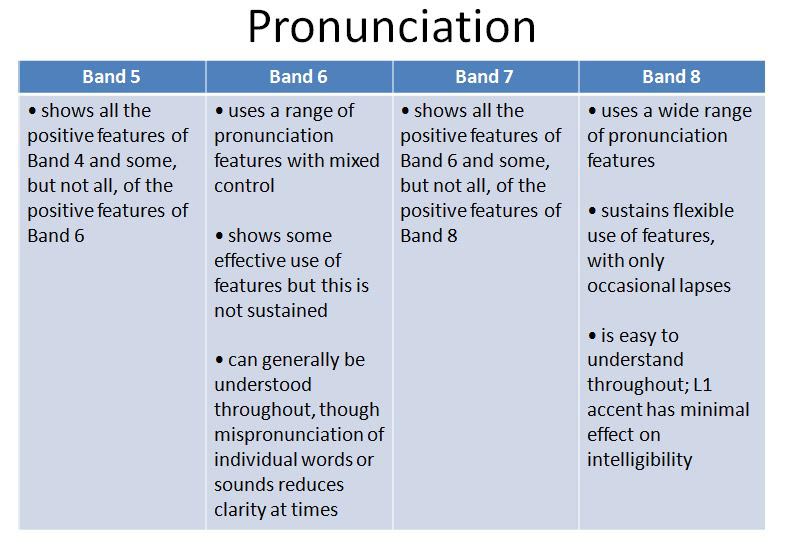
A band 6 student can generally be understood but there are times the examiner finds it difficult to understand what is being said because of pronunciation errors. Some of the pronunciation features described above are used but not throughout the test and there are some mistakes when using them.
A band 7 student ‘shows all the positive features of band 6 and some, but not all, of the positive features of band 8.’
A band 8 student is very easy to understand throughout the exam and individual words are very rarely mispronounced. They use all of the features described above both accurately and appropriately with only occasional mistakes.
Common Problems
- The most common problem is not being able to produce individual phonemes properly. This leads to a breakdown in communication because it stops the examiner understanding the word you are trying to say.
- Another common problem is using little or no intonation. This makes it sound like you have no emotion and not interested in the topic.
Solution– try to sound like you are actually interested or passionate about the topics. If you have positive feelings about what you are saying, intonation will normally follow. I know that some of the topics are a little boring, but try to pretend you are interested.
- Not emphasising at all or emphasising the wrong words in a sentence.
Solution– very generally the most important words or the words that carry meaning are stressed in a sentence. Listen to how native speakers talk and think about which words they normally stress when talking. Soon you will see a pattern and you can incorporate this.
- Saying each word very emphatically without any linking or weak sounds.
Source of Information: Internet
